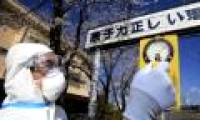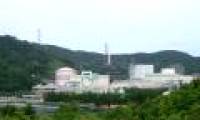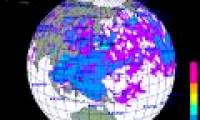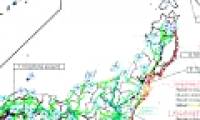
The concentration of radioactivity in the waters near the Fukushima I nuclear power plant, where the incident occurred due to the impact of earthquakes and tsunamis on March 11, is

Regarding the incident of the Fukushima 1 nuclear power plant, the Fukushima prefectural authorities on May 1 said authorities have detected high concentrations of radioactive

Fukui provincial government announced that it was possible that radioactive substances had leaked from fuel rods at the Tsuruga nuclear power plant of Japan Atomic Energy Company

A monitoring station of the Vietnam Atomic Energy Institute yesterday discovered radioactive concentrations in leaves in Hanoi, in small amounts, do not affect human health.

According to a press release issued by the Japanese government, there are currently no airports in the country that have radioactive levels adversely affecting human health.

A series of messages or e-mails spread in Vietnam with misleading content about radiation levels are making people worry. Strong nuclear experts reject this rumor.

Groundwater in the area near the Fukushima nuclear plant was 10,000 times contaminated with safety, while radioactive iodine-131 in seawater rose to a new record threshold.

Japan today has to ask Russia to send a floating radioactive treatment plant, which is used to neutralize nuclear submarines, to concentrate the contaminated wastewater of the

The Japanese Ministry of Health on the morning of March 23 said that radioactive substances beyond the permissible limits were detected in fresh and untreated fresh milk and 11

This morning, the second fire broke out at the Fukushima 1 nuclear power plant's No. 4 reactor - the latest in a series of incidents at the plant, causing the threat of nuclear
 The concentration of radioactivity in the waters near the Fukushima I nuclear power plant, where the incident occurred due to the impact of earthquakes and tsunamis on March 11, is
The concentration of radioactivity in the waters near the Fukushima I nuclear power plant, where the incident occurred due to the impact of earthquakes and tsunamis on March 11, is Regarding the incident of the Fukushima 1 nuclear power plant, the Fukushima prefectural authorities on May 1 said authorities have detected high concentrations of radioactive
Regarding the incident of the Fukushima 1 nuclear power plant, the Fukushima prefectural authorities on May 1 said authorities have detected high concentrations of radioactive Fukui provincial government announced that it was possible that radioactive substances had leaked from fuel rods at the Tsuruga nuclear power plant of Japan Atomic Energy Company
Fukui provincial government announced that it was possible that radioactive substances had leaked from fuel rods at the Tsuruga nuclear power plant of Japan Atomic Energy Company A monitoring station of the Vietnam Atomic Energy Institute yesterday discovered radioactive concentrations in leaves in Hanoi, in small amounts, do not affect human health.
A monitoring station of the Vietnam Atomic Energy Institute yesterday discovered radioactive concentrations in leaves in Hanoi, in small amounts, do not affect human health. According to a press release issued by the Japanese government, there are currently no airports in the country that have radioactive levels adversely affecting human health.
According to a press release issued by the Japanese government, there are currently no airports in the country that have radioactive levels adversely affecting human health. A series of messages or e-mails spread in Vietnam with misleading content about radiation levels are making people worry. Strong nuclear experts reject this rumor.
A series of messages or e-mails spread in Vietnam with misleading content about radiation levels are making people worry. Strong nuclear experts reject this rumor. Groundwater in the area near the Fukushima nuclear plant was 10,000 times contaminated with safety, while radioactive iodine-131 in seawater rose to a new record threshold.
Groundwater in the area near the Fukushima nuclear plant was 10,000 times contaminated with safety, while radioactive iodine-131 in seawater rose to a new record threshold. Japan today has to ask Russia to send a floating radioactive treatment plant, which is used to neutralize nuclear submarines, to concentrate the contaminated wastewater of the
Japan today has to ask Russia to send a floating radioactive treatment plant, which is used to neutralize nuclear submarines, to concentrate the contaminated wastewater of the The Japanese Ministry of Health on the morning of March 23 said that radioactive substances beyond the permissible limits were detected in fresh and untreated fresh milk and 11
The Japanese Ministry of Health on the morning of March 23 said that radioactive substances beyond the permissible limits were detected in fresh and untreated fresh milk and 11 This morning, the second fire broke out at the Fukushima 1 nuclear power plant's No. 4 reactor - the latest in a series of incidents at the plant, causing the threat of nuclear
This morning, the second fire broke out at the Fukushima 1 nuclear power plant's No. 4 reactor - the latest in a series of incidents at the plant, causing the threat of nuclear





 Do signals from extraterrestrial civilizations detected by Sky Eye really exist?
Do signals from extraterrestrial civilizations detected by Sky Eye really exist? 'City without air conditioning' in China: People don't know what heat is!
'City without air conditioning' in China: People don't know what heat is! The element of the sun god is giving scientists a headache
The element of the sun god is giving scientists a headache Unique Village: Roofs Become Roads for Residents!
Unique Village: Roofs Become Roads for Residents! Top 7 strange psychological effects of the brain that we all have without knowing
Top 7 strange psychological effects of the brain that we all have without knowing Which is the most terrifying bedroom elixir in Chinese history?
Which is the most terrifying bedroom elixir in Chinese history? Earth's core may start rotating in reverse
Earth's core may start rotating in reverse A day in Japan can be up to 30 hours long, does this country live in a different 'timeline'?
A day in Japan can be up to 30 hours long, does this country live in a different 'timeline'?